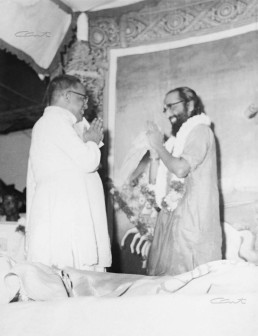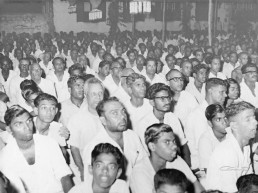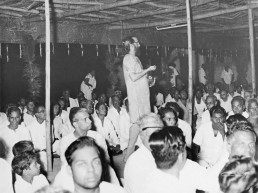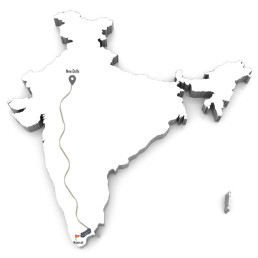
Jnana Yajna 102

Year & Dates:
April 01, 1962 to April 20, 1962

Yajna Topic:
Shrimad Bhagavad Gita- Chapter 2

Place:
Nagercoil, India
Nagercoil, scenic and close to the Arabian Sea at southern tip of India, has a special charm because of the surrounding Western Ghats and the fragrance of its clove and cardamom fields. It is also home to the ancient Nagaraja (the Lord of serpents) temple with an architecture that shows the influence of Jainism.
Called the “Gateway to Kanyakumari,” the city became an energized portal for Pujya Gurudev’s 102nd Jnana Yajna for 21 days from April 4th. It was Nagercoil’s first Jnana Yajna, and the president of the yajna committee, Sri Venkateswara Iyer, and Sri R. Vaidhyanathan, the general secretary along with a sincere team of aspirants spared no efforts in preparing the yajnashala to accommodate the eager crowds and provide an ambience of serene spirituality.
The topic that was chosen was the core philosophy of the Gita, the Sankhya Yoga of chapter 2. In His morning classes, Pujya Gurudev planned to expose the audience of Nagercoil to the beauty of Vedanta through Adi Sankara’s Atma Bodha.
A Wondrous Embodiment of Perfection
In that first momentous decade of Chinmaya Mission, the way that Pujya Gurudev traversed the length and breadth of the country and stirred up a distinct, disciplined movement of spiritual reawakening is stunning in retrospect. He moved swiftly and purposefully. After the Jnana Yajna in the glamorous capital city of Delhi, He flew to Mumbai to supervise the work in Sandeepany Sadhanalaya. Then He flew to Cochin, stopped at Ernakulam to visit and cheer Kochu Narayani Amma, His mother, before hastening to Thiruvananthapuram to reach Nagercoil by car. The miles and destinations seemed to have no impact on Pujya Gurudev, still a thing of utmost wonder for His devotees.
Nagercoil bowed and remained spellbound as Pujya Gurudev systematically introduced seekers to the fundamentals of Vedanta and guided them to epitome – the second chapter that gives a superb synthesis of all the paths, Jnana, Karma, and Bhakti to suit the temperaments of all seekers. The audience were also captivated by the beautiful blend of poetry and plain practicality in His discourses. The way He took the Highest ideals and exhaustively explained how to incorporate them in everyday life was the biggest reason for His yajnashalas to overflow with the intrigued, the interested, or the ignorant.
When Pujya Gurudev walked among the crowds on the last day of the yajna sprinkling the sacred waters of the Ganga, the awed Nagercoil audience glimpsed that He was a realized Master who showed how the Sthithaprajna lakshana, the marks of a Perfected Being, can be achieved while walking among crowds and still transcend everything. Like so many thousands, they considered that yajna an unforgettable part of their lives. They offered with great love and gratitude a small donation to support Sandeepany Sadhanalaya, moved by how Pujya Gurudev blessed them not just with the greatest wisdom of the Gita but also the yajna prasad booklets that became most precious keepsakes in their spiritual journeys.
A Meditation Minute:
ज्ञानयज्ञप्रचारं च ब्रह्मचारिप्रशिक्षणम् । श्रुतिस्मृतिपुराणादिव्याख्याग्रन्थप्रकाशनम् ॥५॥
jñānayajñapracāraṃ ca brahmacāripraśikṣaṇam । śrutismṛtipurāṇādivyākhyāgranthaprakāśanam ॥5॥
- Propagation of the jñāna-yajñas, training of the brahmacāris, publication of the commentaries on Upaniṣads, (Bhagavad) Gītā, Purāṇa and other books.
We prostrate in all humility before the dynamic Pujya Gurudev who carried the torch of Knowledge Absolute, yajna after yajna from December 1951 to July 1993. His incredible foresight in creating the Chinmaya Guru Parampara through hundreds of brahmacharins, and His prolific commentaries on the Prasthana Trayi forever keep Him close and central in our spiritual pursuits.
Photo Gallery
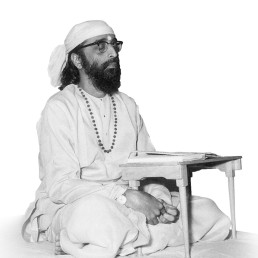
“Think,” Says Pujya Gurudev
In the confession ‘that I am thy disciple’ there are volumes of suggestions summarized. The relationship between the teacher and the taught in India is unique. The student of course has an attitude of total surrender of his master, whom he had tested and found fit for total reverence as nothing short of a living and speaking God for him. The teacher also, having accepted a disciple, considers it his duty to guide the boy always with kindness, love and affection, a thousand times more than any father could ever feel for his own son. If the student is expected to follow faithfully every bit of instructions given out by the teacher, the teacher has also the responsibility of removing all the doubts of the student, even for a hundredth time, if need be.
From Tyagi Magazine
Powerful Message for Teenagers!
Yielding blindly to the demands of the senses without exercising control over them is akin to allowing a ship to drift aimlessly at sea, subject to the whims of the wind. Without direction from the intellect, one’s life becomes scattered and devoid of purpose, leading to a state of agitation and lack of contemplative power. Ultimately, this lack of control over the senses results in a life devoid of both worldly success and inner peace, resembling a ship without a captain, destined to be lost in the tumultuous seas of existence. Watch video for Pujya Gurudev Swami Chinmayananda’s inimitable explanation.


